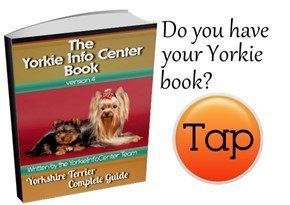Yorkshire Terrier Scooting
Overview
When a Yorkie rubs their bum along the ground, this is known as scooting. It may appear that this is done to scratch an itch or even to clean the rear end after a bowel movement. Some Yorkshire Terriers may do this intermittently or chronically and it may be done just about anywhere or just on certain surfaces like carpeting or grass.
This article will cover the top reasons why a Yorkie will scoot their butt along the ground and what steps to take if you see this behavior.
Please note:
YorkieInfoCenter is reader-supported, and some of the product suggestions on this page are affiliate links. As an Amazon Associate we earn from qualifying purchases. This is at no extra cost to you and helps us continue providing free, high-quality information.
Reason #1: Anal Gland Issues
The most common reason Yorkies rub their rear ends along the floor stems from the anal glands (also known as anal sacs or scent glands).
What these are:
Every dog has a pair of anal glands, located just inside the anal opening, between the external and internal sphincter muscles.
These glands hold an oily substance that is released in tiny quantities each time that a dog meets another dog. The scent is unique to each dog and relays information such as gender, health, and willingness to interact. A small amount is also excreted when a dog has firm and consistent bowel movements.
What happens to cause scooting:
Normally, the body self-regulates this oil, replacing it as needed. However, in some instances, a Yorkie’s anal glands may become engorged. If so, the skin stretches and can become very itchy. A Yorkie may then scoot their butt to scratch that itch. For this reason, many dogs opt to do this against textured surfaces like carpeting or grass.
Additional issues:
If a dog rubs their bum just the right way or scoots hard or long enough, the anal sacs can break open. If this happens, there will be no doubt about it; oil will be smeared along the area (it can range from yellow to tan to almost black) and has an incredibly overpowering smell.
If the skin has a very tiny tear, this foul-smelling oil may slowly seep out, causing a lingering bad odor with no obvious oil leakage.
In both of these cases, broken skin is then susceptible to infection.
What causes this:
Various issues can cause the anal sacs to become engorged. Inflammation of anal tissue can trigger this which can be linked to allergies. A sudden case of soft stools or a period of constipation
can also be to blame. Yet, some Yorkshire Terriers are simply prone to anal gland issues and will require more regular care (details next).
What to do:
1)
Rubbing the bum on the ground is a sign that the glands need to be expressed (excess liquid manually removed) and it is always best to have this done before a Yorkie scoots long or hard enough that they break open. While both dog groomers and veterinarians can perform this task, it is best to have the vet do this so that any underlying causes can be identified.
2)
If you have seen a smear of oil and/or know that the sacs have broken open due to the overwhelming smell, this also requires veterinary care. The glands will be flushed out and antibiotics (topical or oral) may be given to prevent or treat an infection.
3)
If your Yorkie’s stools have become soft recently and scooting has only been occurring for the past few days, firming up the stools may help.
And, if your Yorkie has been constipated with fewer than normal bowel movements, it can help to resolve the constipation.
For both of these issues, adding a bit of pumpkin to a dog’s diet can help. This can be done by mixing a teaspoon of 100% real puree pumpkin (real fruit, not the pie filling) into one meal per day. If there is no improvement with scooting after 3 days, it will be time to have the vet examine your Yorkie.
4)
Going forward, if your Yorkshire Terrier is prone to anal sac issues, your vet may recommend regular expression, which can be done at the vet’s or the dog groomer.
Reason #2: Allergies
What happens:
Though allergies can cause inflammation that then causes anal glands to swell with excess oil (reason #1), allergies alone may cause a Yorkie’s bum to become itchy without the anal glands involved.
If so, symptoms will be similar; a Yorkie will scoot their bum along the grass, carpeting, or other rough surface yet there will be no foul smell or signs of oil.
Itchiness on the bum may be caused by contact allergies which includes elements a Yorkie comes into contact with such as lawn care chemicals or carpet cleaning solution. Or, it can be linked to allergies to airborne elements like pollen or food allergies.
Typically, if a Yorkshire Terrier’s rear end is itchy, other areas on the body, such as the paws, will be as well.
What to do:
1)
Applying a topical anti-itch cream or spray can offer immediate relief while other steps are being taken. One like Bodhi Dog Anti-Itch Spray
 works well for this. This is an all-natural spray with both oatmeal and baking soda, both of which have excellent anti-itch properties.
works well for this. This is an all-natural spray with both oatmeal and baking soda, both of which have excellent anti-itch properties.
2)
If you suspect contact allergies, take care to limit your Yorkie’s exposure to these culprits. Note that lawn care products can end up in your yard from a neighbor’s and that weed-killer, fertilizer, and pesticides can be used in public areas often with warning signs being removed before all residue is truly gone.
At home, do not use any chemical cleaning products in areas that your Yorkie sits or lies down and wash things like dog bed covers and any cuddling blankets with hypo-allergenic ‘clear’ laundry detergent.
3)
If you suspect airborne or food allergens are the cause and/or if there are other bothersome symptoms (running eyes, coughing, wheezing, rash, etc.), there are many steps that may need to be taken to resolve allergies
such as wiping the coat and paws off after a Yorkie has been outside, staying in on days with high pollen count, and/or switching foods. In some cases, antihistamines and other prescribed medications may be needed.
Reason #3: Irritation due to fecal matter.
What happens:
In some cases, a Yorkie will drag their read end along the ground due to simple irritation that can occur when small bits of fecal matter become stuck to the fine hairs around the anus. This may occur after a particularly wet bowel movement, or a small amount may accumulate each time a Yorkie has a normal bowel movement.
What to do:
1)
If you see that there is a lot of fecal matter stuck to the area, it will be time for a bath. You’ll want your Yorkie to soak in warm water longer than usual; after 5 to 10 minutes, use a small soft wash cloth and a quality shampoo to clean the bum.
2)
Going forward, keep your Yorkie’s rear end clean in between baths by wiping the area with a grooming wipe, ideally right after bowel movements since fecal matter is easy to remove before it has dried.
For this, Earthbath All Natural Grooming Wipes
 are ideal. these are very gentle yet very effective and can also be used to touch up the coat, wipe off the paws, clean up the face after eating, etc.
are ideal. these are very gentle yet very effective and can also be used to touch up the coat, wipe off the paws, clean up the face after eating, etc.
Other Less Common but Possible Reasons
Tapeworms
– Dogs can contract tapeworms by ingesting fleas that are infected with tapeworm larvae. These may be apparent in stools or found along the anus, seen as small white segments of the worm that are approximately the size of a grain of rice. Other symptoms of tapeworms include poor coat quality, weight loss, swollen abdomen, and/or diarrhea. This will need to be treated by the veterinarian.
Excessive anal gland expression
– While dogs that are prone to engorged anal glands may need to have them expressed on a regular basis to prevent problems, if these are expressed when it’s not really needed, this can cause issues as well. And, some dog groomers perform this task as part of their regular grooming sessions. So, if you have been taking your Yorkie to the groomer’s ask that this not be done unless you expressly ask for it.
Rectal prolapse
- While rare, this is a condition in which sections of internal anal tissue protrude through the anal opening. There are several causes of this, one of which is excessive straining that may occur if a dog has a particularly severe case of diarrhea or constipation. This is treated with anti-inflammatories and sometimes surgery.
You May Also Like:
Being Allergic to a Yorkshire Terrier- While many claim that dogs with hair are hypoallergenic, this is not true. Proteins in dander, saliva and urine can cause allergic reactions in up to 10% of pet owners.
Yorkshire Terrier Safety
- Read the top 10 things you can do to keep your Yorkie puppy or adult dog safe at all times.
When a Yorkie Eats Grass
- If your little guy or gal grazes on grass, you'll want to read this article. This covers why dogs do this, if there are any negative consequences, and exact steps to stop this behavior.
Yorkie Bad Breath Issues
- Learn why this is so common and steps you can take to resolve this.
How to Fix Dry Skin on a Yorkie
- There are several factors that can cause this breed's sensitive skin to dry out and it's best to resolve this before it spirals into bigger problems.
Fun Safe Ways to Carry a Yorkie
- From backpack-type bags to totes and slings, see some great ways to take your Yorkie with you to all sorts of places.

